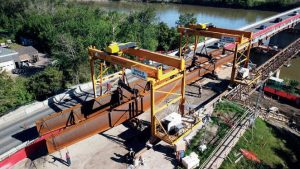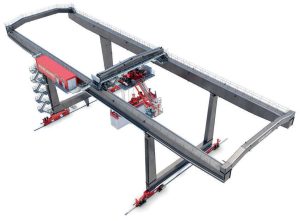Gantry cranes are quite simply lifting devices on legs. Julian Champkin looks at this most useful of concepts.
Gantry cranes are instantly recognisable as a type: they are, quite simply, a horizontal girder on legs. The girder carries a trolley and hoist, and the legs can generally move, on rails, tyres or casters depending on the function and the size of the crane.
- A close-up of ‘Big Red’ at Niagara
- Gantry cranes by Künz at the Schwaiger Holzindustrie log yard
- Graham Construction & Engineering in Canada used two gantry cranes to reconstruct a bridge (
- Graham Construction & Engineering in Canada used two gantry cranes to reconstruct a bridge (1)
- Konescranes’ rail-mounted gantry crane will span six rail lines in Kazakhstan
Sizes can range from the ultra-light and portable – as used in a host of auto repair shops for lifting engines from their chassis – to some of the very largest and heaviest cranes in the world. Typically, these latter are installed in shipyards and go by the name of Goliath cranes. What is claimed as the world’s largest was installed by Konecranes at the Meyer Turku shipyard in Finland and weighs 6,500t, spans 210m and can lift 2,000t.
They have been in use, almost unchanged in general outline, for more than 2,000 years; the Romans used man-powered gantry cranes. That, and the fact that it is so scalable, points to a machine that is fit for purpose. Indeed, no fundamental change in the design has happened until very recently (for that, see nearer the end of the article). But we will start with more standard designs of the larger gantry cranes.
Typical applications for these are in metal or timber stockyards and hydro power station turbine halls. An example is an installation currently under way for the New York Power Authority (NYPA). The authority is the largest state public power organisation in the US, and more than 80% of the power it produces is sourced renewably. This is in no small part due to the hydro power produced by some of the 3,000 tons of water that plummet over the edge of the Niagara Falls every second.
The first electrical generators at Niagara opened in 1881, and the current station, known as the Robert Moses Niagara power plant, has had since its inception a gantry crane 18m wide and standing 21m high in the main turbine hall. Affectionately known by the staff as ‘Big Red’, the crane’s functions include lifting rotors and other major components for maintenance and repair. It is now, however, nearing the end of its useful life.
Its replacement was ordered in the summer of 2022 from REEL COH of Canada. It will have a capacity of 680 tons, which is some 50 tons greater than its predecessor. It will serve the 13 generating units that make up the plant.
The contract for fabrication, delivery and installation is part of a 15-year $1.1bn modernisation and digitisation programme with the title Next Generation Niagara and is worth around $38m.
“The Niagara Power Project’s overhead gantry crane is the workhorse that makes possible all the of the plant’s mechanical upgrades, especially those related to our effort to modernise and extend the life of New York’s flagship clean energy plant,” says NYPA interim president and CEO Justin E. Driscoll. Among its tasks will be assembling and disassembling the generating units. “Many of the efforts to digitise the project are already under way, but a new crane is essential,” he says. A new 15-ton monorail hoist and a 5.0-ton maintenance hoist are also part of the development programme. Construction of the gantry crane is expected be complete by 2026.





没有评论:
发表评论